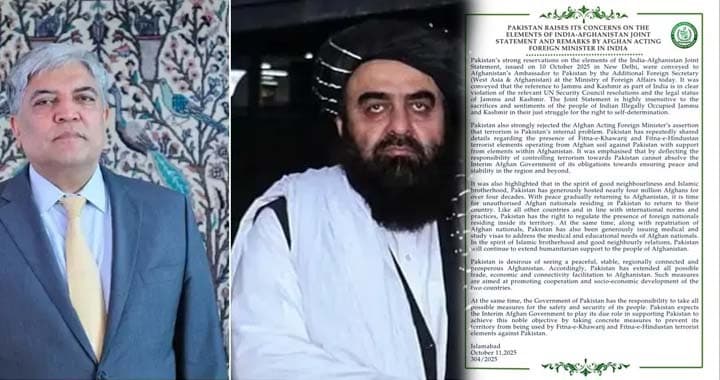Pakistan issued a strong rebuttal to remarks made by Afghanistan’s Acting Foreign Minister Amir Khan Muttaqi during his visit to India, declaring that shifting the burden of terrorism onto Pakistan will not absolve Kabul of its responsibility to eliminate terrorist safe havens and uphold regional stability. The Foreign Office condemned the Afghan minister’s statements as “misleading and irresponsible,” emphasizing that the Afghan interim authorities must ensure that their territory is not used for attacks against Pakistan.
In a statement released late Saturday night, the Foreign Office confirmed that Pakistan’s deep reservations over certain points in the India-Afghanistan joint communiqué had been formally conveyed to the Afghan ambassador through the Additional Secretary at the Ministry of Foreign Affairs. “Afghan officials cannot absolve themselves of their regional responsibilities by blaming Pakistan for terrorism,” the statement read, adding that Pakistan had repeatedly provided evidence of terrorist networks operating from Afghan soil with the support of local elements.
Muttaqi, during a press conference in New Delhi marking the first high-level contact between India and the Taliban regime since 2021 had accused Pakistan of involvement in the October 9 Kabul bombing and claimed that Afghanistan was free of all terrorist groups. He asserted that Afghanistan had seen no unrest for months and argued that “if every country establishes peace as we have, the entire region will remain stable.”
Rejecting these assertions, the Foreign Office said Pakistan “categorically refutes the claim that terrorism is an internal issue of Pakistan,” noting that militant factions such as Fitna al-Khawarij and Fitna al-Hind continue to operate from Afghanistan’s territory and orchestrate cross-border attacks with impunity. “Transferring blame to Pakistan cannot mask the failure to curb terrorist activity inside Afghanistan,” the statement added.
Pakistan also expressed serious objections to the India-Afghanistan joint statement, which referred to Jammu and Kashmir as part of India. The Foreign Office described this as a “gross violation” of UN Security Council resolutions and the internationally recognized legal status of the disputed territory. “Such language is insensitive to the sacrifices and legitimate struggle of the Kashmiri people for their right to self-determination,” the statement said.
Reiterating Pakistan’s longstanding generosity toward Afghanistan, the Foreign Office highlighted that the country has hosted nearly four million Afghan refugees for over four decades “with open hearts and in the spirit of Islamic brotherhood.” It stated that with peace gradually returning to Afghanistan, the time had come for illegal Afghan residents in Pakistan to return to their homeland.
The statement underscored that Pakistan, like every sovereign state, reserves the right to regulate the presence of foreign nationals within its borders in accordance with international norms. It further clarified that Pakistan had issued study and medical visas to Afghan nationals to facilitate education and healthcare, reaffirming that “Pakistan will continue to assist the Afghan people on humanitarian grounds as a neighbour and brotherly nation.”
“Pakistan remains committed to a peaceful, stable, and prosperous Afghanistan, and has extended every possible facilitation in trade, transit, and connectivity to promote bilateral cooperation and regional integration,” the statement continued. “However, the Government of Pakistan bears an overriding responsibility to protect its citizens and ensure national security.”
Concluding the statement, the Foreign Office urged the Afghan interim authorities to fulfil their obligations in preventing the use of Afghan territory for terrorism against Pakistan. “We expect the Afghan leadership to act responsibly, cooperate with Pakistan in the fight against terrorism, and uphold the principles of good neighbourliness,” it said.
Earlier, Defence Minister Khawaja Asif cautioned that Afghanistan’s “export of terrorism” would seriously undermine bilateral relations. In an interview with Geo News, he said, “The terrorism they are exporting to Pakistan will damage relations that we want to maintain with respect and mutual understanding.”
The recent escalation of rhetoric comes amid heightened tensions following Pakistan’s counterterrorism operations in which several soldiers were martyred, and Kabul’s accusations that Pakistan violated its airspace in Paktika and near the Afghan capital. Addressing a press conference in Peshawar earlier, DG ISPR Lieutenant General Ahmed Sharif Chaudhry avoided confirming or denying reports of strikes in Kabul but affirmed that “Pakistan has an inherent right to self-defence,” stressing that “there is credible evidence that Afghan soil is being used as an operational base for terrorism against Pakistan.”





